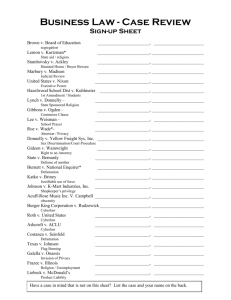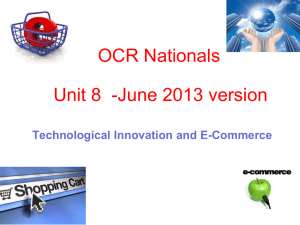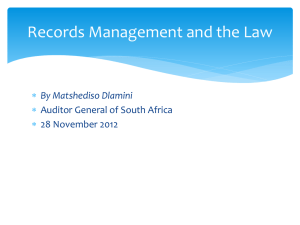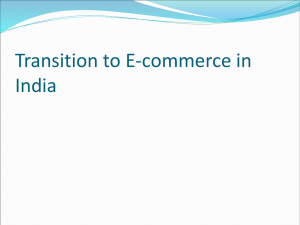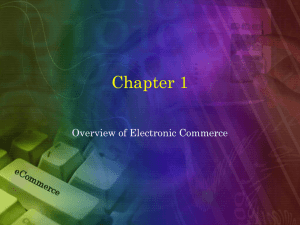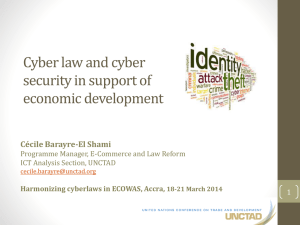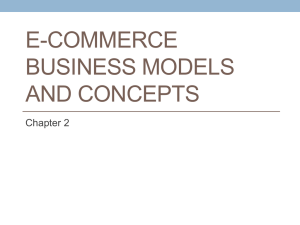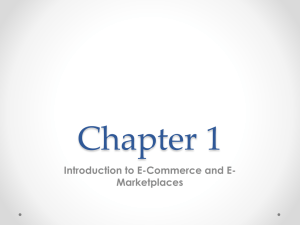2 - e-transactions Law - University of Cape Town
advertisement
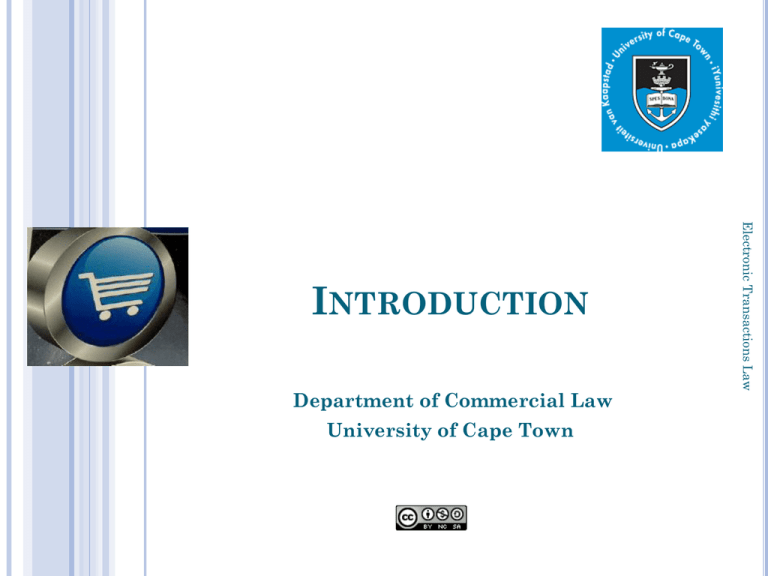
Department of Commercial Law 1 University of Cape Town Electronic Transactions Law INTRODUCTION ELECTRONIC TRANSACTIONS LAW Electronic Transactions Law *"What's in a name? That which we call a rose by any other name would smell as sweet."Romeo and Juliet (II, ii, 1-2) law@IT , cyberlaw@SA, ICT law, IT law, technology law, tech law, computer law, electronic law, social or new media law, digital media law, internet law, cyber law, and web law. 2 WHAT IS AN ELECTRONIC TRANSACTION? No definition in the Electronic Communications and Transactions Act No. 25 of 2002 (ECTA) Working def: commercial and non-commercial transactions concluded wholly or partially through electronic communications, including e-government services Electronic Transactions Law S1 ECTA : ‘electronic communication means a communication by means of data messages’ ‘data message’ means data generated, sent, received or stored by electronic means and includes (a)voice, where the voice is used in an automated transaction; and (b) a stored record; ‘data’ means electronic representations of information in any form 1. Does the definition of data messages include voice, where it is not used in an automated transaction? 2. Is the definition of electronic communication in ECTA substantively different from that in the Electronic Communications Act? 3 TECHNOLOGIES Internet (via computers, TVs and mobile phones) Online ‘tools’: websites, email, VOIP, social networks Electronic Transactions Law R Buys & J Rothman ‘the internet: an overview’ in Cyberlaw@SA http://www.cyberlawsa.co.za/cyberlaw/cybertext/chapter1.htm B M Leiner et al ‘Brief history of the internet’ http://www.internetsociety.org/internet/internet-51/historyinternet/brief-history-internet History of the internet (video) by Melih Bilgil http://www.youtube.com/watch?v=9hIQjrMHTv4 Telephone (land and mobile) 4 TYPES OF TRANSACTIONS & LEGAL ISSUES Intellectual property Jurisdiction Electronic Transactions Law Contract Business to business (B2B ecommerce) Business to consumer (B2C ecommerce) Privacy Consumer to consumer (C2C) Employer to employee (workplace communications) Government to business (e-procurement) security Government to citizen Labour Law Tax Delict Fundamental rights Criminal law Consumer Law 5 WHY DO WE NEED ELECTRONIC TRANSACTIONS LAW? Is it just like ‘the law of the horse’? Electronic Transactions Law Frank H. Easterbrook ‘Cyberspace and the Law of the Horse’ Lawrence Lessig ‘The Law of the Horse: What Cyberlaw Might Teach’ Do the unique characteristics of e-commerce require the development of a separate body of law/regulation? what is the policy framework for this law? 6 SOUTH AFRICA’S E-COMMERCE POLICY 1. Quality of life 2. International Benchmarking 3. Consultative process 4. Flexibility 5. Technology neutrality 6. Supporting private-sector-led and technology-based solutions and initiatives 7. Public-Private partnership 8. Supporting small, medium and micro enterprises (SMMEs) and informal sector Electronic Transactions Law (1999) Discussion Paper (2000) Green Paper identified the following underlying principles (par 1.2): 7 SOUTH AFRICA’S E-COMMERCE POLICY (2) GREEN PAPER Focus issues 1. 2. 3. 4. the needfor confidence in the security and privacy of transactions performed electronically; to enhance the information infrastructure for electronic commerce; to establish rules that will govern electronic commerce; to bring the opportunities of e-commerce to the entire population 1. Legal and regulatory issues 2. Building trust in the digital economy 3. Access, infrastructure and enabling 4. Technologies 5. Maximising the benefits: economic and social impacts * No White Paper Electronic Transactions Law Themes 8 POLICY (3) Electronic Transactions Law National Information Society and Development Plan, 2007 (e-strategy required by s5(1) ECTA) National Integrated ICT Policy Colloquium, 19 April 2012 (e-commerce & digitising government commission) see overview at http://kganyago.org/2012/04/24/the-beginning-of-abeginning-integrated-ict-policy-for-south-africa/ National Cyber Security Policy Framework for South Africa approved by Cabinet, 2012 9 DISCUSSION Is the policy framework comprehensive and meaningful? Has the policy framework lead to appropriate legislation? Electronic Transactions Law 10 RELEVANT LEGISLATION 1. 2. 4. 5. 6. 7. 8. 9. * And all relevant Regulations Electronic Transactions Law 3. The Constitution, 1996 The Promotion of Access to Information Act, 2000 Independent Communications Authority of South Africa Act, 2000 Electronic Communications and Transactions Act, 2002 The Regulation of Interception of Communications Act, 2002 The Electronic Communications Act, 2005 National Credit Act, 2005 Consumer Protection Act, 2008 Protection of Personal Information Bill, 2009 11 OTHER DOMESTIC SOURCES OF LAW Common law (defamation, privacy contract) Trade usage and custom (standards, ‘code as law’) Authoritative academic texts Electronic Transactions Law 12 INTERNATIONAL LAW 1. Constitution ‘Customary international law is law in the Republic unless it is inconsistent with the Constitution or an Act of Parliament.’ 3. Domestic law is to be interpreted with recourse to international law; s233 Constitution ‘When interpreting any legislation, every court must prefer any reasonable interpretation of the legislation that is consistent with international law over any alternative interpretation that is inconsistent with international law.’ Electronic Transactions Law 2. Impacts domestic law in 3 ways viz informs domestic legislation e.g. ECTA & UNICTRAL Model Law Customary international law is binding; s232 13 INTERNATIONAL LAW Electronic Transactions Law Article 38(1) of the Statute of the International Court of Justice defines international law as: (a) international conventions (treaties), whether general or particular; (b) international custom, as evidence of a general practice accepted as law; (c) the general principles of law recognized by civilized nations; (d) judicial decisions and teachings of the most highly qualified publicists as subsidiary means for the determination of rules of law. 14 RELEVANT INTERNATIONAL LAW, SOME EXAMPLES United Nations Commission on International Trade Law (UNCITRAL) Model Law on Electronic Commerce (1996, revised 1998) Model Law on Electronic Signatures (2001) United Nations Convention on the Use of Electronic Communications in International Contracts, 2005 (SA not a party) Electronic Transactions Law Task Find and list other sources of relevant international law. 15 SOME IMPORTANT INTERNATIONAL AGENCIES Electronic Transactions Law UNICTRAL ITU (International Telecommunication Union) The United Nations Economic and Social Commission for Asia and the Pacific(ESCAP) Organisation for Economic Co-operation and Development (OECD) World Trade Organisation (WTO) Southern African Development Community (SADC) - Declaration on Information and Communications Technology (ICT), 2001 & Draft SADC model law on electronic transactions and electronic commerce, 2012 16 Electronic Transactions Law Electronic Transactions Law compiled by Caroline B Ncube is licensed under a Creative Commons AttributionNonCommercial-ShareAlike 2.5 South Africa License. To view this a copy of this license visit http://creativecommons.org/licenses/by-nc-sa/2.5/za/ 17
